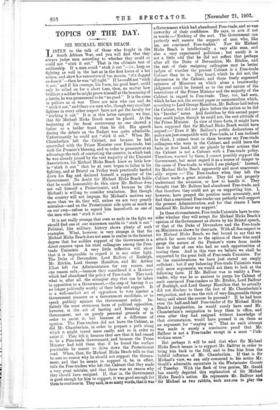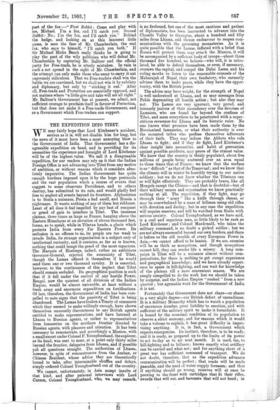TOPICS OF THE DAY.
SIR MICHAEL HICKS BEACH. T,ISTEN to the talk of those who fought in the South African 'War, and you will find that they always judge men according to whether they could or could not "stick it out." That is the ultimate test of soldiership. If a man could "stick it out "—i.e., keep on fighting as well in the last as in the first hours of a hot action, and show his veneration of tae maxim, "it's dogged as does it"—then he was "all right." if he could not "stick it out," and if his courage, his force, his good.heart, could only be relied on for a short time, then, no matter how brilliant a soldier he might prove himself at the beginning of a battle, he was pronounced to be "no good." It is the same in politics as in war. There are men who can and do "stick it out," and there are men who, though very excellent fighters in every other respect have not got the faculty for "sticking it out." It is in this latter category, we fear, that Sir Michael Hicks Beach must be placed. At the beginning of the fiscal controversy no one showed a better or a bolder front than he did. His speech during the debate on the Budget was quite admirable. Unfortunately he could not "stick it out." When Mr. Chamberlain left the Cabinet, not because he had quarrelled with the Prime Minister over Free-trade, but with the Premier's blessing, and in order to prosecute at an advantage the task of converting the country, in which tas. k he was already joined by the vast majority of the Unionist Associations, Sir Michael Hicks Beach knew so little how to "stick it out" that he at once began to falter in his fighting, and at Bristol on Friday week practically hauled dawn his flag and declared himself a supporter of the Government. No doubt Sir Michael Hicks Beach holds that he could honourably do this, since Mr. Balfour does not call himself a Protectionist, and because he (Sir Michael) is willing to consider retaliation. But though the country will not impugn Sir Michael's motives any more than we do, they will, unless we are very greatly mistaken—and on the Protectionist side quite as much as on our own—refuse to regard him henceforth as one of the men who can "stick it out."
'It is not really strange that even so early in the fight we should find one of our statesmen unable to "stick it out." Political, like military, history shows plenty of such examples. What, however, is very strange is that Sir Michael Hicks Beach does not seem to realise in the faintest degree that his sudden support of the Government is a direct censure upon his chief colleagues among the Free- trade Unionists. A very little reflection will show that it is impossible to regard it in any other light. The Duke of Devonshire, Lord Balfour of Burleigh, Mr. Ritchie, Lord George Hamilton, and Mr. Arthur Elliot left the Administration for one reason, and one reason only,—because they considered it a Ministry which had abandoned the policy of Free-trade. They took what is, after all, the strongest step that can be taken in opposition to a Government.—the step of leaving it as no longer politically worthy of their help and support. It is a well-marked act of opposition to vote against a Government measure or a Government candidate, or to speak publicly against the Government policy. In- finitely the most strenuous form of political opposition, however, is the act of leaving and breaking up a Government, not on purely personal grounds or in order to assist it, but because of a difference of opinion. The Free-traders did not leave the Cabinet, as did Mr. Chamberlain, in order to prepare a path along which it might travel more easily, and so in order to assist it.. They left it because they saw that it had ceased to be a Free-trade Government, and because the Prime Minister had told them that if he found the surface practicable he meant to drive down the Protectionist road. When, then, Sir Michael Hicks Beach tells us that he sees no reason why he should not support the Govern. ment, and that he means to support it, he, in effect, tells the Free-traders who left the Cabinet that they made a very great mistake, and that there was no reason why they should have resigned. If, that is, the Government is good enough for him to support, it was good enough for them to continue in. They said, in so many words, that it was a Government which had abandoned Free-trade, and so was- unworthy of their confidence. He says, in acts if not in words Nothing of the sort. The Government can perfectly well receive the support of men who, like me, are convinced Free-traders. Now Sir Michael Hicks Beach is intellectually a very able man, and also a very experienced politician ; but surely it is not a little odd that he did not reflect that perhaps after all the Duke of Devonshire, Mr. Ritchie, and.• the rest of their resigning colleagues may be better judges of whether the present Cabinet is a Free-trade Cabinet than he is. They heard, which he did not, the discussions in the Cabinet, and those 'freely expressed opinions of Ministers on which alone a trustworthy judgment could be formed as to the real nature of the convictions of the Prime Minister and the majority of the Cabinet in regard to Free-trade. They, too, had seen, which he has not, the second paper or memorandum which, according to Lord George Hamilton, Mr. Balfour laid before the Cabinet, but did not place before the nation as he did his "Insular" notes. And doubtless by this second paper they could judge, though he could not, the real attitude of the Prime Minister. In view of these facts, it might have been supposed that Sir Michael Hicks Beach would have argued :—' Even if Mr. Balfour's public declarations of policy are just compatible with Free-trade, as I am inclined to think, I cannot trust to them because my Free-trade colleagues who were in the Cabinet, and could learn the facts at first hand, tell me plainly by their actions, that the Cabinet is not a Cabinet with a . Free-trade policy. Therefore, warned by them, I cannot poisibly support the Government, but must regard it as a source of danger to the cause of Free-trade, to which I am pledged.' Instead,' Sir Michael Hicks Beach apparently and most unaccount- ably argues The Free-traders when they left the Cabinet made a great mistake. They did not properly understand the situation, or how to handle it. They thought that Mr. Balfour had abandoned Free-trade, and that therefore they could not go on supporting him. I, however, have gauged the position more accurately, and find that a convinced Free-trader can perfectly well support the present Administration, and for that reason I have tendered Mr. Balfour my support.'
In these circumstances, Free-trade Unionists have to con- sider whether they will accept Sir Michael Hicks Beach's opinion of the Government as shown by his Bristol speech, or that of the Duke of Devonshire and the Free-trade ex-Ministers as shown by their acts. With all due respect to Sir Michael Hicks Beach, we feel bound to say that we attach far more value to the opinion of those who could gauge the nature of the Premier's views from inside than to that of one who had no such opportunities of testing them. And in this view, we believe we shall be supported by the great bulk of Free-trade Unionists. For us the considerations we have just stated are amply sufficient ; but if any balancing Free-trade Unionists want still more arguments, we would ask them to look at the following facts. If Mr. Balfour was in reality a Free- trader, why was he so anxious to purge his Cabinet of such convinced Free-traders as Mr. Ritchie, Lord Balfour of Burleigh, and Lord George Hamilton that he actually did not disclose to them the fact of Mr. Chamberlain's resignation, and so ran the risk of very disagreeable things being said about the course he pursued? If he had been even the half-and-half Free-trader of Sir Michael Hicks Beach's imagination, he would surely have used Mr. Chamberlain's resignation to keep them in office, and even after they had resigned without knowledge of that circumstance, would have pressed it on them as an argument for "staying on." That no such attempt was made is surely a conclusive proof that Mr. Balfour is not a Free-trader except in a most " Pick- wickian sense."
But perhaps it will be said that wire k Sir Michael Hicks Beach means is to support Mr. Baltrur in order to bring him back to the fold, and to free him from the baleful influence of Mr. Chamberlain. If that is Sir Michael's view, we can only commend to his notice Mr. Gould's admirable caricature in the Wertminster Gazette of Tuesday. With the flash of true genius, Mr. Gould has exactly depicted this explanation of Sir Michael Hicks Beach's action. He represents lir. Balfour and Sir Michael as two rabbits, each an: ,ous to play. the part of the fox :—"Pirst Rabbit : Come and play with me, Michael. I'm a fox, and I'll catch you. Second Rabbit: No; I'm the fox, and I'll catch you." Behind the hedge, and looking on at this innocent little game, is seen the face of Mr. Chamberlain, the real fox, who says to himself, "I'll catch you both." If Sir Michael Hicks Beach really thinks he is going to play the part of the wily politician who will defeat Mr. Chamberlain by capturing Mr. Balfour and the official party for Free-trade, he is utterly mistaken. In vain is such a net spread in the sight of Mr. Chamberlain, and the attempt can only make those who essay to carry it out supremely ridiculous. That we Free-traders shall win the battle we are convinced, but we shall not win it by subtlety and diplomacy, but only by "sticking it out." After all, Free-trade and Protection are essentially opposed, and not matters where "a little give and take will set all right." Mr. Balfour's Government has at present, we admit, not sufficient courage to proclaim itself in favour of Protection, but that does not make it a Free-trade Government, and so a Government which Free-traders can support.



























































 Previous page
Previous page